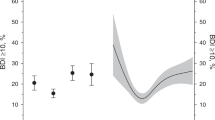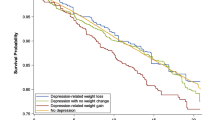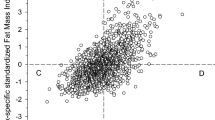Abstract
The hypothesis of metabolically healthy obesity posits that adverse health effects of obesity are largely avoided when obesity is accompanied by a favorable metabolic profile. We tested this hypothesis with depressive symptoms as the outcome using cross-sectional data on obesity, metabolic health and depressive symptoms. Data were extracted from eight studies and pooled for individual-participant meta-analysis with 30 337 men and women aged 15–105 years (mean age=46.1). Clinic measures included height, weight and metabolic risk factors (high blood pressure, high triglycerides, low high-density lipoprotein cholesterol, high C-reactive protein and high glycated hemoglobin). Depressive symptoms were assessed using clinical interview or standardized rating scales. The pooled sample comprised 7673 (25%) obese participants (body mass index ⩾30 kg m–2). Compared to all non-obese individuals, the OR for depressive symptoms was higher in metabolically unhealthy obese individuals with two or more metabolic risk factors (1.45; 95% confidence interval (CI)=1.30, 1.61) and for metabolically healthy obese with ⩽1 metabolic risk factor (1.19; 95% CI=1.03, 1.37), adjusted for sex, age and race/ethnicity. Metabolically unhealthy obesity was associated with higher depression risk (OR=1.23; 95% CI=1.05, 1.45) compared with metabolically healthy obesity. These associations were consistent across studies with no evidence for heterogeneity in estimates (all I2-values<4%). In conclusion, obese persons with a favorable metabolic profile have a slightly increased risk of depressive symptoms compared with non-obese, but the risk is greater when obesity is combined with an adverse metabolic profile. These findings suggest that metabolically healthy obesity is not a completely benign condition in relation to depression risk.
This is a preview of subscription content, access via your institution
Access options
Subscribe to this journal
Receive 12 print issues and online access
$259.00 per year
only $21.58 per issue
Buy this article
- Purchase on Springer Link
- Instant access to full article PDF
Prices may be subject to local taxes which are calculated during checkout

Similar content being viewed by others
References
Luppino FS, de Wit LM, Bouvy PF, Stijnen T, Cuijpers P, Penninx B et al. Overweight, obesity, and depression: A systematic review and meta-analysis of longitudinal studies. Arch Gen Psychiatry 2010; 67: 220–229.
Wardle J, Chida Y, Gibson EL, Whitaker KL, Steptoe A . Stress and adiposity: a meta-analysis of longitudinal studies. Obesity 2011; 19: 771–778.
Markowitz S, Friedman MA, Arent SM . Understanding the relation between obesity and depression: causal mechanisms and implications for treatment. Clin Psychol-Sci Pr 2008; 15: 1–20.
Gariepy G, Nitka D, Schmitz N . The association between obesity and anxiety disorders in the population: a systematic review and meta-analysis. Int J Obesity 2010; 34: 407–419.
Jokela M, Elovainio M, Keltikangas-Järvinen L, Batty GD, Hintsanen M, Seppälä I et al. Body mass index and depressive symptoms: instrumental-variables regression with genetic risk score. Genes Brain Behav 2012; 11: 942–948.
de Wit L, Luppino F, van SA, Penninx B, Zitman F, Cuijpers P . Depression and obesity: a meta-analysis of community-based studies. Psychiat Res 2010; 178: 230–235.
Lawlor DA, Hart CL, Hole DJ, Gunnell D, Smith GD . Body mass index in middle life and future risk of hospital admission for psychoses or depression: findings from the Renfrew/Paisley study. Psychol Med 2007; 37: 1151–1161.
Palinkas LA, Wingard DL, Barrett Connor E . Depressive symptoms in overweight and obese older adults: a test of the 'jolly fat' hypothesis. J Psychosom Res 1996; 40: 59–66.
Gariepy G, Wang JL, Lesage AD, Schmitz N . The longitudinal association from obesity to depression: results from the 12-year National Population Health Survey. Obesity 2010; 18: 1033–1038.
Bluher M . The distinction of metabolically 'healthy' from 'unhealthy' obese individuals. Curr Opin Lipidol 2010; 21: 38–43.
Denis GV, Obin MS . 'Metabolically healthy obesity': origins and implications. Mol Aspects Med 2013; 34: 59–70.
Despres JP . What is 'metabolically healthy obesity'? From epidemiology to pathophysiological insights. J Clin Endocrinol Metab 2012; 97: 2283–2285.
Ortega FB, Lee DC, Katzmarzyk PT, Ruiz JR, Sui X, Church TS et al. The intriguing metabolically healthy but obese phenotype: cardiovascular prognosis and role of fitness. Eur Heart J 2013; 34: 389–397.
Singh-Manoux A, Czernichow S, Elbaz A, Dugravot A, Sabia S, Hagger-Johnson G et al. Obesity phenotypes in midlife and cognition in early old age: the Whitehall II cohort study. Neurology 2012; 79: 755–762.
Hamer M, Stamatakis E . Metabolically healthy obesity and risk of all-cause and cardiovascular disease mortality. J Clin Endocrinol Metab 2012; 97: 2482–2488.
Stefan N, Häring HU, Hu FB, Schulze MB . Metabolically healthy obesity: epidemiology, mechanisms, and clinical implications. Lancet Diabetes Endocrinol 2013; 1: 152–162.
Phillips CM . Metabolically healthy obesity: definitions, determinants and clinical implications. Rev Endocr Metab Disord 2013; 14: 219–227.
Hamer M, Batty GD, Kivimäki M . Risk of future depression in people who are obese but metabolically healthy: the English longitudinal study of ageing. Mol Psychiatry 2012; 17: 940–945.
Rosero-Bixby L, X F, WH D . CRELES: Costa Rican Longevity and Healthy Aging Study, 2005 (Costa Rica Estudio de Longevidad y Envejecimiento Saludable) [Computer file]. ICPSR26681-v2. Inter-university Consortium for Political and Social Research [distributor]: Ann Arbor, MI, 2010 doi:10.3886/ICPSR26681.v2.
Ryff CD, Seeman T, Weinstein M . National Survey of Midlife Development in the United States (MIDUS II): Biomarker Project, 2004-2009 [Computer file]. ICPSR29282-v1. Inter-university Consortium for Political and Social Research [distributor]: Ann Arbor, MI, 2010 doi:10.3886/ICPSR29282. 2010.
Power C, Elliott J . Cohort profile: 1958 British birth cohort (National Child Development Study). Int J Epidemiol 2006; 35: 34–41.
Centers for Disease Control and Prevention (CDC). National Center for Health Statistics (NCHS). National Health and Nutrition Examination Survey Data. Hyattsville, MD: U.S. Department of Health and Human Services, Centers for Disease Control and Prevention. http://www.cdc.gov/nchs/nhanes.htm.
Shay CM, Ning H, Daniels SR, Rooks CR, Gidding SS, Lloyd-Jones DM . Status of cardiovascular health in US adolescents: prevalence estimates from the National Health and Nutrition Examination Surveys (NHANES) 2005-2010. Circulation 2013; 127: 1369–1376.
Marmot M, Brunner E . Cohort profile: the Whitehall II study. Int J Epidemiol. 2005; 34: 251–256.
Kivimäki M, Batty GD, Singh-Manoux A, Nabi H, Sabia S, Tabak AG et al. Association between common mental disorder and obesity over the adult life course. Br J Psychiatry 2009; 195: 149–155.
Kivimäki M, Lawlor DA, Singh-Manoux A, Batty GD, Ferrie JE, Shipley MJ et al. Common mental disorder and obesity-insight from four repeat measures over 19 years: prospective Whitehall II cohort study. Br Med J 2009; 339: b3765.
Kivimäki M, Jokela M, Hamer M, Geddes J, Ebmeier K, Kumari M et al. Examining overweight and obesity as risk factors for common mental disorder using FTO genotype-instrumented analysis: the Whitehall II study, 1985-2004. Am J Epidemiol 2011; 173: 421–429.
Wildman RP, Muntner P, Reynolds K, McGinn AP, Rajpathak S, Wylie-Rosett J et al. The obese without cardiometabolic risk factor clustering and the normal weight with cardiometabolic risk factor clustering: prevalence and correlates of 2 phenotypes among the US population (NHANES 1999-2004). Arch Intern Med 2008; 168: 1617–1624.
Radloff LS . The CED-D scale: self-report depression scale for research in the general population. Appl Psych Meas 1977; 1: 385–401.
Sheikh JI, Yesavage JA, Brooks JOr, Friedman L, Gratzinger P, Hill RD et al. Proposed factor structure of the Geriatric Depression Scale. Int Psychogeriatr 1991; 3: 23–28.
Lewis G, Pelosi AJ, Araya R, Dunn G . Measuring psychiatric disorder in the community: a standardized assessment for use by lay interviewers. Psychol Med 1992; 22: 465–486.
Robins LN, Helzer JE, Croughan J, Ratcliff KS . National Institute of Mental Health Diagnostic Interview Schedule. Its history, characteristics, and validity. Arch Gen Psychiatry 1981; 38: 381–389.
Kroenke K, Spitzer RL, Williams JB . The PHQ-9: validity of a brief depression severity measure. J Gen Intern Med 2001; 16: 606–613.
Koster A, Stenholm S, Alley DE, Kim LJ, Simonsick EM, Kanaya AM et al. Body fat distribution and inflammation among obese older adults with and without metabolic syndrome. Obesity 2010; 18: 2354–2361.
Pan A, Keum N, Okereke OI, Sun Q, Kivimaki M, Rubin RR et al. Bidirectional association between depression and metabolic syndrome: a systematic review and meta-analysis of epidemiological studies. Diabetes Care 2012; 35: 1171–1180.
Renn BN, Feliciano L, Segal DL . The bidirectional relationship of depression and diabetes: a systematic review. Clin Psychol Rev 2011; 31: 1239–1246.
Raison CL, Miller AH . The evolutionary significance of depression in pathogen host defense (PATHOS-D). Mol Psychiatry 2013; 18: 15–37.
Capuron L, Su S, Miller AH, Bremner JD, Goldberg J, Vogt GJ et al. Depressive symptoms and metabolic syndrome: Is inflammation the underlying link? Biol Psychiatry 2008; 64: 896–900.
Kivimaki M, Shipley MJ, Batty GD, Hamer M, Akbaraly TN, Kumari M et al. Long-term inflammation increases risk of common mental disorder: a cohort study. Mol Psychiatry 2013; doi: 10.1038/mp.2013.35 (e-pub ahead of print).
Pan A, Ye X, Franco OH, Li H, Yu Z, Zou S et al. Insulin resistance and depressive symptoms in middle-aged and elderly Chinese: findings from the Nutrition and Health of Aging Population in China Study. J Affect Disord 2008; 109: 75–82.
Kivimäki M, Tabak AG, Batty GD, Singh-Manoux A, Jokela M, Akbaraly TN et al. Hyperglycemia, type 2 diabetes, and depressive symptoms: the British Whitehall II study. Diabetes Care 2009; 32: 1867–1869.
Musselman DL, Evans DL, Nemeroff CB . The relationship of depression to cardiovascular disease: epidemiology, biology, and treatment. Arch Gen Psychiatry. 1998; 55: 580–592.
Bornstein SR, Schuppenies A, Wong ML, Licinio J . Approaching the shared biology of obesity and depression: the stress axis as the locus of gene-environment interactions. Mol Psychiatry 2006; 11: 892–902.
McElroy SL, Kotwal R, Malhotra S, Nelson EB, Keck PE, Nemeroff CB . Are mood disorders and obesity related? A review for the mental health professional. J Clin Psychiatry 2004; 65: 634–651.
Jokela M, Hintsanen M, Hakulinen C, Batty GD, Nabi H, Singh-Manoux A et al. Association of personality with the development and persistence of obesity: a meta-analysis based on individual-participant data. Obes Rev 2013; 14: 315–323.
Acknowledgements
This research was supported by the Academy of Finland (grant numbers: 124322, 124271 and 132944); the BUPA Foundation, UK; Medical Research Council (MRC, K013351); the US National Institutes of Health (R01HL036310; R01AG034454) and the Finnish Work Environment Fund. The Centre for Cognitive Ageing and Cognitive Epidemiology is supported by the Biotechnology and Biological Sciences Research Council, the Engineering and Physical Sciences Research Council, the Economic and Social Research Council, the Medical Research Council and the University of Edinburgh as part of the cross-council Lifelong Health and Wellbeing initiative. MH is supported by the British Heart Foundation (RE/10/005/28296). GDB is a Wellcome Trust Fellow. MK is an Economic and Social Research Council Professor. The study sponsors did not contribute to the study design and had no role in data collection, data analysis, data interpretation or the writing of the report.
Author information
Authors and Affiliations
Corresponding author
Ethics declarations
Competing interests
The authors declare no conflict of interest.
Additional information
Supplementary Information accompanies the paper on the Molecular Psychiatry website
Supplementary information
PowerPoint slides
Rights and permissions
About this article
Cite this article
Jokela, M., Hamer, M., Singh-Manoux, A. et al. Association of metabolically healthy obesity with depressive symptoms: pooled analysis of eight studies. Mol Psychiatry 19, 910–914 (2014). https://doi.org/10.1038/mp.2013.162
Received:
Revised:
Accepted:
Published:
Issue Date:
DOI: https://doi.org/10.1038/mp.2013.162
Keywords
This article is cited by
-
Body weight in neurological and psychiatric disorders: a large prospective cohort study
Nature Mental Health (2024)
-
Quality of life and psychosocial outcomes among children with metabolically healthy and unhealthy obesity
Pediatric Research (2023)
-
Emotional states of different obesity phenotypes: a sex-specific study in a west-Asian population
BMC Psychiatry (2021)
-
Antidepressants fluoxetine and amitriptyline induce alterations in intestinal microbiota and gut microbiome function in rats exposed to chronic unpredictable mild stress
Translational Psychiatry (2021)
-
Subjective well-being in non-obese individuals depends strongly on body composition
Scientific Reports (2021)



